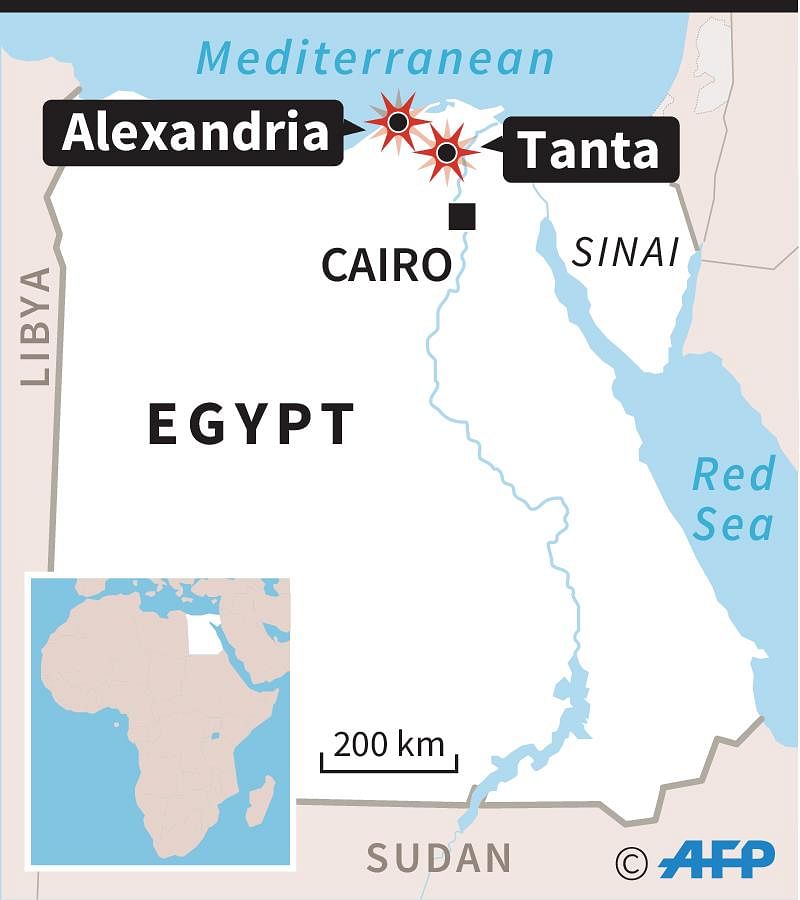CAIRO (Reuters, AFP) - At least 17 people were killed in an Alexandria church bombing on Sunday (April 9), hours after a bomb killed 27 worshippers in another church in Egypt, the health ministry said.
Thirty-five people were wounded in the Alexandria blast, which has been claimed by the Islamic State group (ISIS), at Saint Mark's church where Coptic Pope Tawadros II had been attending a Palm Sunday Mass.
A Coptic Church official said that Tawadros had left the church before the blast and was not injured. The church is symbolic as it is the seat of the Pope of Alexandria, head of the Coptic Church.
"These acts will not harm the unity and cohesion of the people," he was later quoted as saying by state media.
The BBC reported the Pope's secretary as saying that the attack had been carried out by a suicide bomber outside the church.
According to media reports, the authorities are searching the area for possible explosives that may still be in the vicinity.
ISIS has claimed responsibility for the attack, said the Amaq News Agency, which is affiliated with the extremist group.
An earlier blast at a church in Tanta, north of Cairo, killed 27 people and wounded 78, the health ministry said, in an apparent attack on Coptic worshippers. That attack has also been claimed by ISIS.
Copts, who make up about one tenth of Egypt's population of more than 92 million and who celebrate Easter next weekend, have been targeted by several attacks in recent months.
Pope Francis is due to visit Cairo on April 28-29 to show solidarity with Egypt's Christian community.
ISIS said two of its fighters wearing suicide vests carried out the attacks, and it warned of more to come.
"Crusaders and their apostate allies should know the bill between us and them is very big and they will pay it with rivers of blood from their children, god willing. Wait for us, for we will wait for you," the group said in a statement.
In a televised speech addressing the nation, Sisi declared a three-month countrywide state of emergency, subject to parliamentary approval, and called for national unity and urged the media to refrain from coverage that could be harmful.
"Deal with the issue with credibility, and responsibility and awareness," he said of the media coverage. "It's not right what I'm seeing being repeated on all of our channels, and you know this hurts Egyptians."
Sisi also ordered troops be immediately deployed to assist police in securing vital facilities, a rare move for the general-turned-president, who as defence chief led the military's 2013 ouster of the Muslim Brotherhood's President Mohamed Mursi.
Deflecting Western criticism that he has suppressed political opposition and human rights activists since he was elected in 2014, Sisi has sought to present himself as an indispensable bulwark against terrorism in the Middle East.
"The attack...will only harden the determination (of the Egyptian people) to move forward on their trajectory to realise security, stability and comprehensive development," Sisi said in a statement.
President Trump, who hosted Sisi last week in his first official visit to the US, expressed support for a leader he has said he plans to work more closely with on fighting Islamist militants, who Sisi identifies as an existential threat.
"So sad to hear of the terrorist attack in Egypt. US strongly condemns. I have great confidence that President Al Sisi will handle situation properly," Trump wrote on his official Twitter account.
The ISIS branch in Egypt has stepped up attacks and threats against Christians, who comprise about 10 percent of Egypt's 90 million people and are the biggest Christian minority in the Middle East.
In February, scores of Christian families and students fled Egypt's North Sinai province after a spate of targeted killings. Those attacks followed one of the deadliest on Egypt's Christian minority, when a suicide bomber hit its largest Coptic cathedral, killing at least 25 people. Islamic State later claimed responsibility for that attack.
ISIS has waged a low-level war against soldiers and police in Egypt's Sinai Peninsula for years but is now targeting Christians and broadening its reach into Egypt's mainland. That is a potential turning point in a country trying to prevent a provincial insurgency spiralling into wider sectarian bloodshed.
Although Copts have faced attacks by Muslim neighbours, who have burnt their homes and churches in poor rural areas, in the past, the community has felt increasingly insecure since Islamic State spread through Iraq and Syria in 2014.
"Of course we feel targeted, there was a bomb here about a week ago but it was dismantled. There's no security," said another Christian woman in Tanta in reference to an attack earlier this month near a police training centre.
Wahby Lamie, one of whose nephews was killed and another injured in the Tanta blast, expressed exasperation.
"How much longer are we going to be this divided? Anyone who's different from them now is an infidel, whether they're Muslim or Christian. They see them as infidels," he said. "How much longer are these people going to exist? And how much longer will security be this incompetent?"




